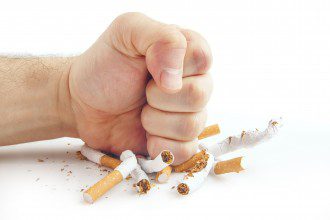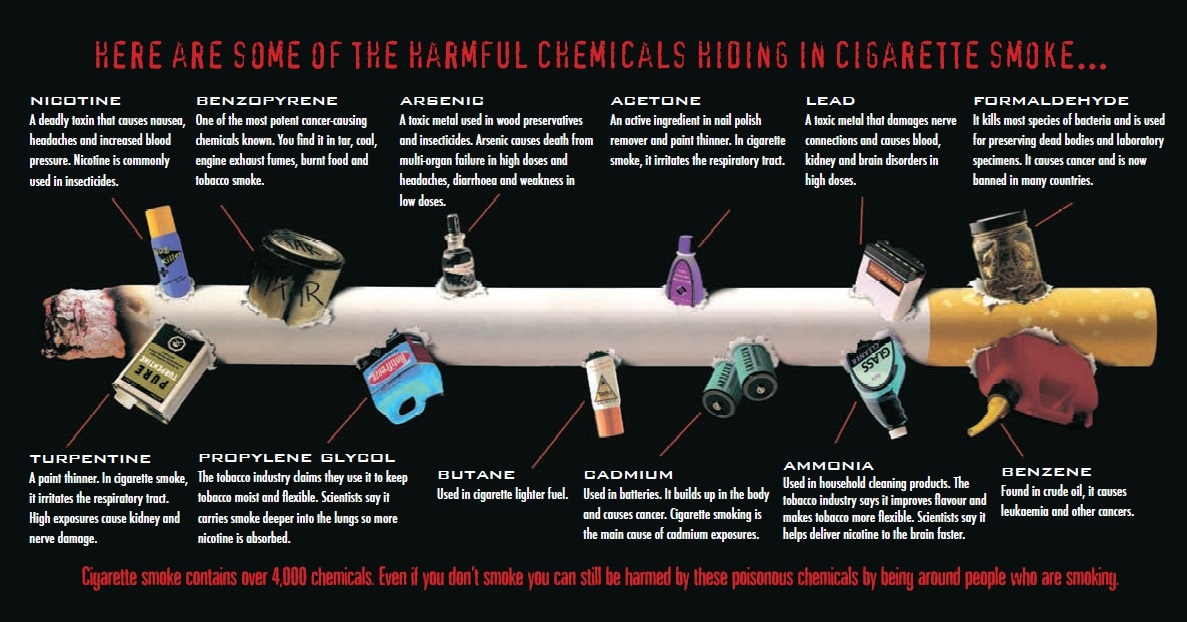Contributing Writer for Wake Up World
“A cigarette is the only consumer product which, when used as directed, kills its consumer.” ~ Dr. Gro Harlem Brundtland
Since the 1950s the public has been aware of the dangers of tobacco, and yet the industry continues to thrive. Thinking we’re more powerful than a lowly weed, we allow ourselves to be seduced by the sexy allure of tobacco only to realise, once it’s too late, that we weren’t quite as impervious to its charms as we hoped.
In Native American culture tobacco was viewed as a sacred plant that was used in a ritual context. By limiting its use to ceremonies major problems of addiction were avoided. Today in Western culture the custodians of tobacco are no longer the community’s wise men and women – instead they are some of the most greedy and morally-corrupt corporations on earth, entities that prioritise profit over individual welfare.
“Don’t let tobacco companies make the choices for you… They care about their own well-being, not yours” ~ Wayne Dyer
Tobacco is responsible for more deaths than car accidents, alcohol, murder, suicide, illegal drugs and fire combined. In the U.S. alone, upwards of 400,000 people die each year from tobacco related illnesses. We all know how bad cigarettes are for our health, and yet many of us find the challenge of quitting too much to bear. However, while it is difficult, it is absolutely possible to eliminate this toxic presence from our lives.
Timeline: What Happens to Your Body When You Quit Smoking
It can be helpful to the quitting process when we understand the stages of the process and the health rewards we will reap if we move through them.
20 minutes after your last cigarette:
- Heart rate and blood pressure return to normal.
- More sensation in extremities.
- Body begins to detox from the nicotine (this can intensify cravings — a glass of water can help alleviate the feeling)
8 hours after the last cigarette:
- Carbon monoxide in the body is halved
- Oxygen levels return to normal
- Heart attack risk is lowered
48 hours after the last cigarette:
- Nerve endings become more receptive
- Increased sense of taste and smell
- Nicotine will no longer be circulating in your body
72 hours after the last cigarette:
- Respiratory system regulates
- breathing improves (lung capacity increased)
- Cilia in lungs and trachea begins to repair itself
- Risk of heart attack, kidney failure and cardiovascular disease further diminished
- The hardest part is over!
2 -12 weeks after the last cigarette:
- Depending on how long and much you smoked coughing should be significantly reduced
- Increased stamina
- Improved circulation
- More nutrients being delivered where they are needed
- Lungs begin the process of cleansing and repairing themselves
- Increased irritability (be gentle with yourself and others and remember it is just a stage in the process—this too shall pass)
3 to 9 months after the last cigarette:
- Increased energy levels
- Due to better nutrient absorption skin becomes softer, more supple and vital looking
- Lung function increased by up to 10%
- Continued improvement in breathing and decrease in coughing and wheezing
- Appetite no longer suppressed
1 to 5 years after the last cigarette:
- Risk of heart disease reduced by half (compared to when smoking regularly)
- Cravings completely eliminated, or extremely manageable by this stage
- Risk of cancer (lung, pancreas, bladder, mouth etc) reduced by up to 50%
- External signs of smoking should have completely disappeared by this time (ugly tobacco stains on teeth and fingers)
- Feelings of guilt and self-reproach (due to indulging in self-destructive behaviour) replaced with feelings of dignity and confidence
10 to 15 years after the last cigarette:
- Pre-cancerous cells replaced with healthy cells
- After fifteen years of not smoking the chances of developing heart disease, Lupus, Alzheimer’s, cancer (and many more) will be on a par with someone who never smoked!
- Lowered risk of impotence (that’s gotta be a good incentive for the guys!)
Incentives:
A good incentive is one of the best things to be armed with when deciding to tackle our addictions. Here are a few incentives to help you quit smoking:
Return to health: one of the best incentives to quit smoking is the knowledge that we will regain our health and vitality.
Reduce toxins: thousands of chemicals accompany each drag; by quitting we eliminate a major source of toxins in our environment.
Financial reward: today cigarettes are highly taxed. For someone who smokes a pack a day this can mean a saving of thousands of dollars a year.
Corporate dependency: another major incentive is ditching a dependency on some of the most evil corporations in the world. Every time we smoke a cigarette we support a wicked, uncaring industry that has built itself up through lies and deception and caused untold pain and suffering the world over.
Pregnancy: having a tiny life within that is affected by everything we consume can be a very powerful incentive to quit.
Role model: knowing the risks, I doubt anyone would want their child to take up smoking. By quitting smoking we become better role models for our children.
Herbs to Help You Quit:
These are a few herbs among many that can assist the quitting process. It can be useful to visit an herbalist or naturopath before embarking on the journey to quit as they can assist you to create a quit smoking plan based on your specific needs.
Catnip: helps reduce anxiety and irritability and can be taken as a tea or tincture. In tincture form a couple of drops on the back of the tongue is said to alleviate cravings. Some people smoke it during the transition from smoker to non-smoker, but it has been known to cause headaches.
Lobelia: also known as Indian Tobacco is an herb that can be very useful for quitting. I know several people who used it as a tobacco substitute and found that it greatly eased the transition. The body reacts to the natural chemicals in lobelia in a similar way as it does to nicotine, however lobelia is not as toxic to the body and is not addictive like nicotine. It is also acts to calm the nerves, ease tension, and assists the lungs to heal. Note: Lobelia is a powerful herb and should be taken with care. High doses can cause nausea and vomiting. Do not take if suffering from heart disease, seizures, tobacco sensitivity, or are recovering from shock.
Mullein: is another herb that helps the lungs to heal and acts to promote a sense of calmness. It can be smoked or taken as a tincture.
Calamus (acorus calamus): is also a useful herb for assisting the lungs to heal and for reducing anxiety levels. Another benefit is that it provides extra energy which can be useful during the quitting process.
Dealing with irritability: passionflower and valerian are both herbs that can help with irritability as they promote relaxation and calmness.
General Tips:
Avoid triggers like alcohol, coffee, stress and sugar in the initial period. Remember that the first three months are the hardest. According to Joel Spitzer, who has worked in the quit smoking industry for more than thirty years, a person who indulges in just one cigarette in the first three months of quitting is almost guaranteed to relapse. His claim is confirmed by a 1990 study, “Postcessation Cigarette Use: The Process of Relapse” which found that 93.5% of people who succumbed to ‘just one’ cigarette during the initial twelve weeks of quitting went on to experience a full relapse.
Support groups: these days there are many support groups available for people who want to quit smoking. If it is not appealing, or possible to make it to a physical group there are online communities that share valuable information and support for quitting.
Oral replacements: oil infused toothpicks can be a flavourful substitute that provides the comfort of hand and mouth connection without negative health consequences or calories.
Rewards: save up the money that you would have been spending on cigarettes and reward yourself at milestones in the quitting process.
Deep breathing exercises: a spiritual teacher I worked with several years ago used to say that part of the appeal of cigarettes is that they help us to suppress uncomfortable emotions. If we have used cigarettes this way (and I think most do) the quitting experience is even more challenging as we no longer have an effective strategy for managing these undesired feelings. It is often when intense circumstances arise that people ‘break’ and fall into relapse. When these feelings surface instead of resorting to a cigarette, try deep breathing. Unlike smoking which suppresses the emotions, breathing helps us shift and release them. Crying is also a powerful means of processing emotions and many claim that in the first few months of quitting they often find themselves fighting the urge to cry. If possible allow the tears to flow as, like breathing, this will help keep the energy flowing and avoid a backlog of emotion that could eventually become so powerful it sends us rushing for the pack.
Visualization: It can be helpful to take a few minutes every morning to vividly imagine yourself living your life smoke-free. Focus on the feelings of satisfaction, pride and delight you feel at having conquered a powerful addiction. This simple process will help solidify the knowledge that this is an achievable task and help to overcome any unconscious fears or doubts that could sabotage the process.
“Quitting smoking can be a very good test of ones character. Pass the test and you will have accomplished so much more than just get rid of one bad habit” — Abraham H. Maslow
Sources:
- www.webmd.com/smoking-cessation/features/10-overlooked-reasons-to-quit-smoking
- www.flowingfree.org/best-herbs-to-help-you-quit-smoking
Previous articles by Christina Lavers:
- New Study Shows Regular Contact with Nature Reduces Crime, Increases Social Cohesion
- Research Shows Just 7 Minutes of Meditation Can Reduce Racial Prejudice
- Taking Care of Our Inner Tribes – Microflora, Awakening and You
- Groundbreaking Study Maps the Decline of Wild Bee Communities in the United States
- Taking Responsibility For Our Energy
- More Evidence That TV is Dumbing Us Down
- Discernment – Navigating The Spiritual Minefield
- Synchrony and Exertion of Dancing Found to Encourage Social Bonding, Raise Pain Threshold
About the author:
Christina Lavers is a writer, an artist, a creative enthusiast, and an inner world explorer. Born in Montreal Quebec Canada, she now lives with her life partner and son in a rainforest pocket in the hills behind Coffs Harbour, NSW Australia. She spends her time playing, creating, growing and sharing.
Christina is devoted to assisting people to find and connect with their own creative magical current that flows deep within. She is now offering a comprehensive e-course designed to help people light up their world with passion and creativity. You can access Section One here for free!
Christina has also recently published her first full length book, a memoir about her wild awakening journey entitled Jump Into the Blue, and she is currently working on the next one.
“My journey has been about personal alchemy… exploring the mysteries of my soul and my environment, and learning to bring all aspects, the light and the dark, together with the transcending ingredient… love. The more I uncover and nurture the wounded aspects of my being, the more whole and grounded I feel and the more my outer world reflects the love, wonder and magic I have discovered inside”.
You can follow Christina’s work at:

If you've ever found value in our articles, we'd greatly appreciate your support by purchasing Mindful Meditation Techniques for Kids - A Practical Guide for Adults to Empower Kids with the Gift of Inner Peace and Resilience for Life.
In the spirit of mindfulness, we encourage you to choose the paperback version. Delve into its pages away from screen glare and notifications, allowing yourself to fully immerse in the transformative practices within. The physical book enriches the learning process and serves as a tangible commitment to mindfulness, easily shared among family and friends.
Over the past few years, Wake Up World has faced significant online censorship, impacting our financial ability to stay online. Instead of soliciting donations, we're exploring win-win solutions with our readers to remain financially viable. Moving into book publishing, we hope to secure ongoing funds to continue our mission. With over 8,500 articles published in the past 13 years, we are committed to keeping our content free and accessible to everyone, without resorting to a paywall.










